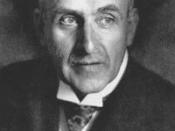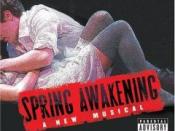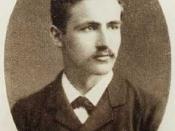Adolescence is hard enough when you do know what it's all about. But imagine going through puberty with no knowledge of sex, no sexual outlet, and no reliable sources of information about sex. "Spring Awakening", a pre-Expressionist masterpiece written in the 1890s by Frank Wedekind, is about just such a horror.
"Spring Awakening" is about a group of young horny German kids growing up in a total vacuum of sexual knowledge. They know their urges and dreams must mean something, but the adults won't explain it to them -- "common decency" prevents even mentioning it. The kids are left to fend for themselves, and as is often the case today, they come up with the wrong information -- or worse, none at all. Their natural curiosity is disillusioned and turned against them, so that the frustration builds and they turn to violence, thinking theymselves inherently perverse and evil for being so fixated.
They explore beatings, masturbation, homosexuality, and rape with no real idea of what they're doing or what the consequences might be. One, Moritz (Alwyn Kotzè), is driven to commit suicide. Wendla (Shalaine Scharmrel), a 14-year-old girl, is raped in a hayloft on the same day her mother tells her babies come from the stork. When she gets pregnant, her furious mother (who still has not explained where babies come from) brings in a midwife and the poor girl dies of a substandard abortion. Melchior (Geon Nel), the unintentional rapist, is sent to a reformatory; he escapes and meets the ghost of his dead friend Moritz. Moritz tries to bring him over to the "other side," but relents and admits that death is a terrible void and that he bitterly regrets both his suicide and his incredible naiveté.
The adults don't fare any better;...


